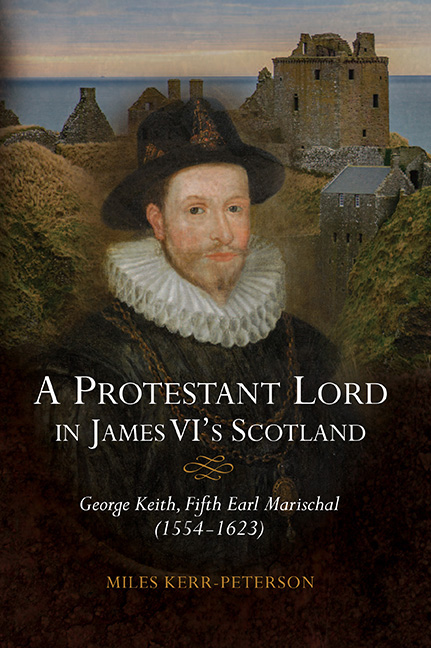Book contents
- Frontmatter
- Contents
- List of Illustrations
- Acknowledgements
- Conventions
- Abbreviations
- Map
- Introduction
- 1 Inheritance and Education, 1513–1582
- 2 Three Feuds and Jacobean Politics, 1582–1595
- 3 Service to the State, 1595–1623
- 4 Defending the Borders of the Earldom, 1595–1623
- 5 Family Strategies and Crises, 1595–1623
- 6 Lordship and the Reformed Kirk, 1560–1623
- 7 Economic Activities, 1581–1623
- 8 Marischal College, 1593–1623
- Conclusion
- Appendices: Genealogies
- Bibliography
- Index
- St Andrew Studies in Scottish History
4 - Defending the Borders of the Earldom, 1595–1623
Published online by Cambridge University Press: 13 April 2019
- Frontmatter
- Contents
- List of Illustrations
- Acknowledgements
- Conventions
- Abbreviations
- Map
- Introduction
- 1 Inheritance and Education, 1513–1582
- 2 Three Feuds and Jacobean Politics, 1582–1595
- 3 Service to the State, 1595–1623
- 4 Defending the Borders of the Earldom, 1595–1623
- 5 Family Strategies and Crises, 1595–1623
- 6 Lordship and the Reformed Kirk, 1560–1623
- 7 Economic Activities, 1581–1623
- 8 Marischal College, 1593–1623
- Conclusion
- Appendices: Genealogies
- Bibliography
- Index
- St Andrew Studies in Scottish History
Summary
We have already seen Marischal's major conflicts with the earl of Huntly and Chancellor Maitland, both of which were intimately tied to court politics and resolved by 1595. Beyond these major disputes, which encompassed court and locality, Marischal pursued a series of lesser local clashes with several individuals right up until his death. Whereas most studies of feuding and conflict in Scotland concentrate on larger specific feuds, or explore one particular type of conflict, few have considered the individual perspective, which puts the larger struggles in context and gives a greater sense of the full spectrum of dispute. So, while Marischal's feud with Huntly up to 1595 is the most sensational conflict, the underlying root of that struggle being the jurisdiction of the Lieutenant of the North, it can be better understood if we look to Marischal's lesser disputes, in terms of both their underlying principles and the resulting conduct. These feuds cast useful light on the running, exercise and priorities of his lordship, as they show what kinds of issue provoked the earl into action. In particular, they show the severe problems arising from disputed boundaries of varying sorts: not only those of land and property, but also of jurisdiction and authority.
Defining and categorising conflict in this period is difficult. Keith Brown highlighted how contemporary definitions of feuding were unhelpfully vague, so bloodfeud is best thought of as being only one facet of a range of disputes and modes of dispute resolution. Marischal conducted his quarrels within the context of a transitional period, when the informal framework of the Scottish bloodfeud – essentially ritualised violence supported by a kin network to achieve dispute settlement – gave way to a more legalistic court-based system of dispute settlement and corrective justice. Whether Marischal's case corresponds to this decline in violence and out-of-court mediation in favour of legal recourse is inherently difficult to answer; the evidence is naturally skewed towards the latter owing to the records it generated. No doubt there were several confrontations, meetings and settlements throughout the earl's life that went unrecorded. The major problem in assessing Marischal's feud with the earl of Huntly in the previous chapters was the lack of detail; from contemporary reports we know that it was happening, but we do not know exactly how.
- Type
- Chapter
- Information
- A Protestant Lord in James VI's ScotlandGeorge Keith, Fifth Earl Marischal (1554–1623), pp. 91 - 102Publisher: Boydell & BrewerPrint publication year: 2019



